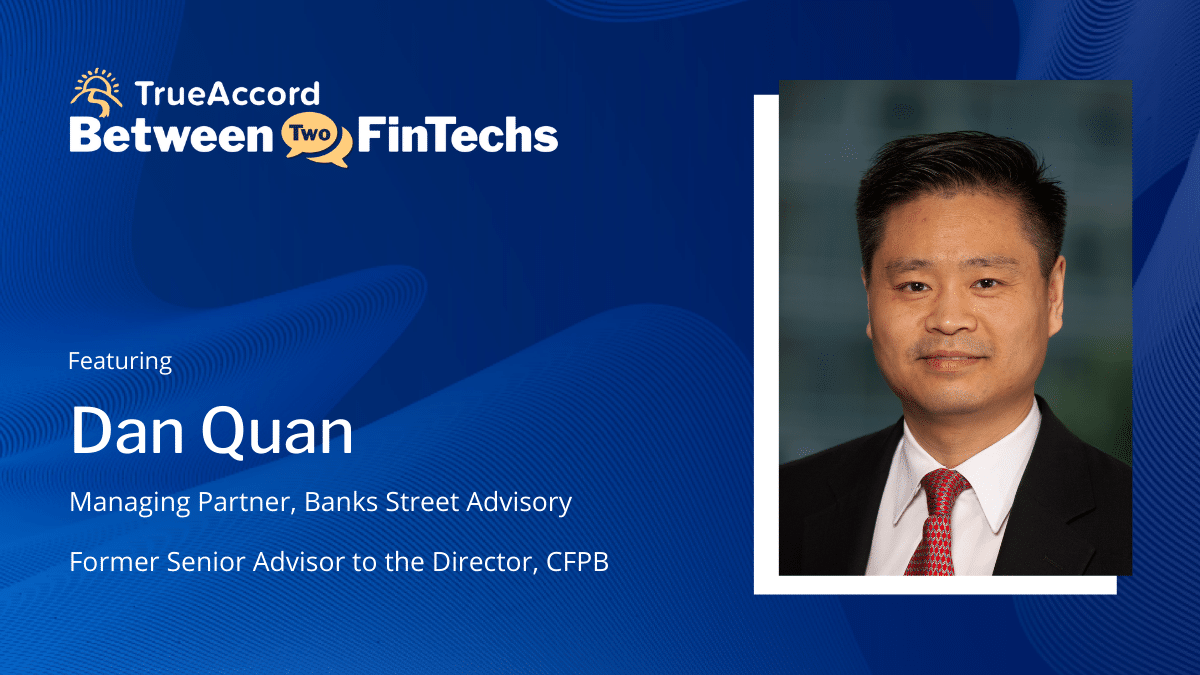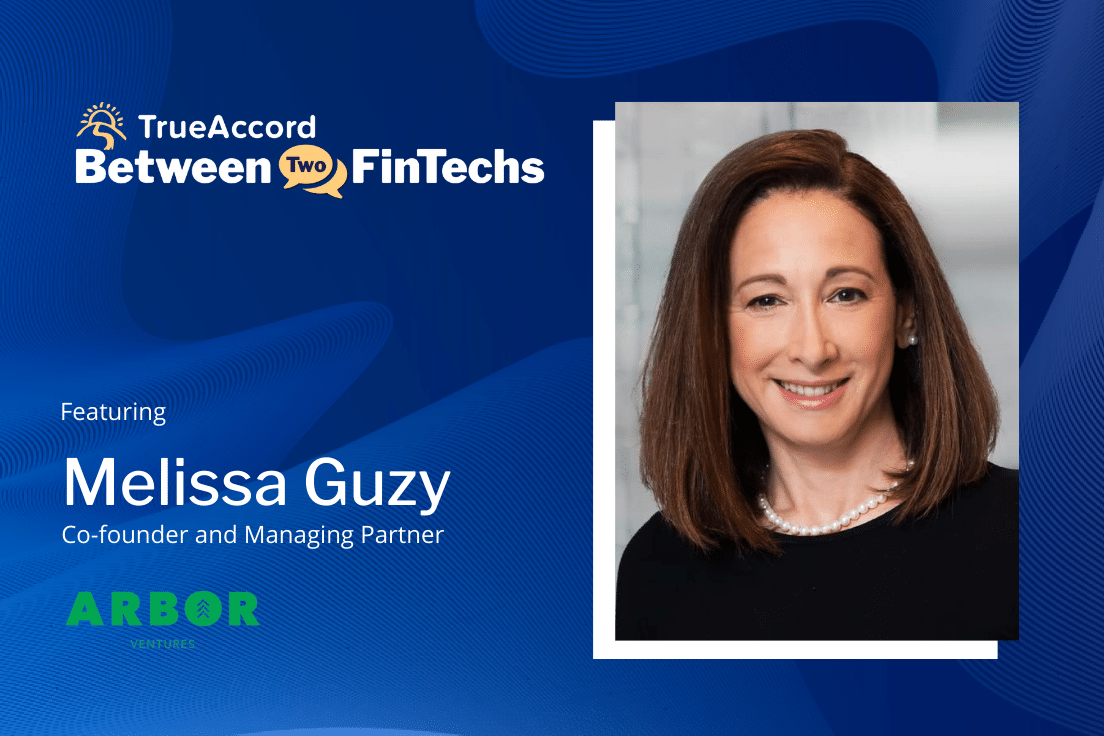
In this edition of “Between Two Fintechs,” TrueAccord founder Ohad Samet interviews Dan Quan, Managing Partner of Banks Street Advisory and formerly the Senior Advisor to the Director at the Consumer Financial Protection Bureau (CFPB). Dan led its fintech office, Project Catalyst, the first of its kind in the world, inspiring regulatory agencies across the globe to set up dedicated innovation hubs to promote financial innovation.
At the CFPB, Dan focused his work on consumer-permissioned data access/open banking and the use of AI and alternative data in credit underwriting. A nationally recognized fintech thought leader, Dan serves as a bridge between Silicon Valley and the Beltway, and we’re honored to feature him in this series.
This transcript was conducted in October 2020 and has been edited and condensed for clarity. You can see all the interviews here.
Ohad Samet: Welcome Dan, we’re so excited to speak with you today about your experience working with fintechs at the CFPB and your perspective around regulation, technology and consumer financial services.
Dan Quan: Thank you. Fintech companies, like yours at TrueAccord, are a really exciting sector.
In the earlier days at the Bureau, I remember walking into the office the first day, and it was a conference room with 20 computers. We had to work or have meetings in the hallway or kitchen. The Bureau’s staff mindset was, this is once-in-a-lifetime thing. I believe the Bureau was the first agency that recognized the promise of fintech. We got a lot of good information and data from folks like you to help the Bureau write better rules and make better policies.
OS: Yes, it’s been very interesting to work with the Bureau’s research department, and be able to provide anonymized aggregate data to support the Bureau’s requests for comment. But it’s not like you guys were very gentle on the enforcement side. There were a lot of inspections of FinTech companies, so without asking you to comment about specific issues, I’m wondering about how you found the balance between encouraging innovation but also enforcing regulation?
DQ: I think it’s really a balancing act, right? I will say there’s one common misconception about the CFPB: that there was never a “human side of the Bureau.” When we talk to companies, we also recognize that enforcement is a very blunt tool. It’s very effective, it shows results immediately, but at the same time it also can crush a business. It also doesn’t really help the market come up with better solutions.
How can you come up with better products to not only comply with the regulations, but also serve people better? Obviously, the work we did at Project Catalyst, the innovation office was trying to do that.
Informal conversations, interactions or idea exchanges with market participants are just as valuable. If you ask me what I’m most proud of that I did at the CFPB, it was the effort to push open banking in the United States. It involved so many conversations and research from various market participants from financial institutions, from think tanks, data aggregators, users, nonprofits and consumer advocates.
OS: Yes, I think it’s very satisfying for me, and I hope by extension to the team in general. The work that we’re doing gave federal regulators enough data needed to make these decisions. That was a very positive experience of being involved in federal policy even if we’re just a tiny cog in the machine
Pivoting a bit, there are a lot of new fintech solutions, such as microlenders like Dave, or those giving employees access to their payroll early, like neobanks and Earnin. What are you seeing in terms of trends in federal policy and how they’re thinking about this new crop of solutions.
DQ: You mentioned companies like Dave, Earnin, PayActiv, starting with earned wage access—allowing people to get to their paychecks anytime on demand with a small fee or sometimes just a tip or for free. Chime and Varo started doing this too, plus adding overdraft protection programs. They are all challenging the status quo. That’s going to be bad news for banks who rely on fee income. What’s interesting is that these new product offerings from such fintechs are merging to offer solutions that try to make their customers live a financially healthy life.
A lot of conversations are actually at the state level, whether these are payday lenders, or whether they actually are a better alternative to consumers. We shall see how things are going to play out in the next couple of years.
OS: You mentioned state-level attention, which reminded me of the discussion in the last few years around, if the CFPB is less active, state AGs are going to pick up the mantle and be more active. No one is an oracle, but what are some possible scenarios from your perspective for the CFPB after the elections?
DQ: I would imagine if President Trump is re-elected, we’ll see the status quo where there will be continuous fights between federal and the state regulators. States may think the CFPB is not doing an adequate job, whether that’s true or perception and will want to come in and fill the gap, which is manifesting itself in California, right? But I also want to point out one thing we should still realize is that there are still a lot of collaborations between the CFPB and the states.
If Biden becomes the president, I think you will see more collaboration. In the case of California, once their consumer finance agency is set up, they are not going to walk that back.
I believe it’s always better to talk to regulators, to help them understand what you do, as long as you’re a good actor—rather than operating in the dark, and have no idea what kind of rule is going to come down at you in the future.
OS: For our last question, can you talk about the challenges for regulation regarding machine learning? I think we’ve spent a lot of time trying to build a system that is not overly complex and is reasonably easy to explain. But there are machine learning techniques, like deep learning, for example, that are almost impossible or very hard to explain.
DQ: Explainability is really a key thing. If the practitioner cannot explain to a regulator, I think it will make a regulator feel extremely uneasy. But obviously if you go back to the old ways where everything is explainable, you obviously lose all the upside the machine learning can bring, so it’s a very delicate balance.
What we really need is more exchange of ideas, information between the CFPB, the financial regulators and the companies that are experimenting in the space. I think the CFPB started working with Upstart, for example, on how to strengthen the compliance management system, so I hope the CFPB will publish that in the near future so that everybody can take a look and say, “This is what they did and it looks like it worked.”
OS: I would say from our perspective, we’ve always tried to do something that’s within the bounds of the law, collect the data, then go to the regulator and say, “Here, this is how it’s working, so we think this should be the direction.” The worst results I have seen in terms of rules that have come out were when industry participants went to regulators and said, without context, “Hey, give us clear guidance” and the guidance always came back not as expected.
DQ: Exactly.
OS: Dan, thank you so much for your time. I’m sure we will continue to be in touch and maybe work together in the future.
DQ: Absolutely, I will look forward to it! Thank you so much for having me.

